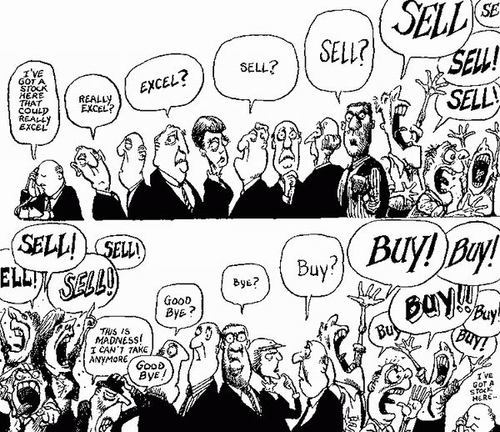
Mike Higgins' talk at the Peirson attracted a roomful of people - about 23-24. Without wishing to stereotype, I would say that finance industry types were probably under-represented. I intersperse my own comments and interpretations throughout this piece.
Mike initially "did a Daniel" by discovering that he had forgotten part of his material but he managed to do a very interesting talk, that covered a lot of material, off the cuff - no-one would have realised if he hadn't told us... he wasn't a lecturer in economics for nothing!
He started by saying that Jersey was not technically in a recession yet but soon would be - this was due to the lag of the figures behind reality. A true recession needs two quarters of negative growth. A depression would be a long term 10% fall in growth. He sketched out the basic reasons why the global economy is in the state it is and suggested that one of the reasons for the almost total lack of credit available at the moment is because the banks and institutions are all suspicious of each other - they don't know who it is safe to lend on to, even if they get deposits, because they don't know who to trust with all the unknown amounts of toxic debts floating around on the other party's balance sheets.
With reference to the Jersey States, Mike said that it was proving extremely hard to get information out of civil servants and he suggested that the Island was run by the top civil servants (who are obviously un-elected). I can't see that this is a healthy situation as, let's just assume, if we had a situation where the top civil servants were neither civil nor our servants and their hierarchical organisation meant that anybody who didn't toe the "from on high" party line couldn't progress in (or even stay in the service), then this would have inevitably lead to a self-reinforcing, self-propagating and virtually impregnable system. Not good. If true, it explains an awful lot of what happens in Jersey. Even when we employ new civil servants from outside the Island, clearly the HR processes of the States are constrained to employ people who will fit in, and be cosy with, the existing Mandarins, structures, employees, beliefs and practices.
Very not good.
We heard that in England and Wales, up to 1/3 of the shops are empty and it's a similar picture on the industrial estates.
Mike said that he had had meetings with the Fiscal Policy Panel, a high powered group of three national-level economists who advise the States of Jersey on financial matters. He asked them flat out what they thought about the situation and basically the truth of the matter is that absolutely nobody is sure how this will play out - it is an unprecedented situation - there have been recessions before, and also depressions, but there has never been a global depression/recession before. Bear this in mind next time you hear Terry le Sueur and Philip Ozouf metaphorically singing "the Sun'll come out tomorra - bet your bottom dollar".
Perhaps now the architects of globalisation, "efficiency", competition, mergers and acquisitions, consolidation, outsourcing and downsizing etc etc will come to realise the final consequences of their bankrupt philosophy as the sting in the tail of shifting most manufacturing to China and allowing international finance to grow too big, too speculative and too unregulatable comes home to roost (I love mixing metaphors!).
They all thought simple economic growth would lead everybody to prosperity, employment, security and cheap goods. Instead, it has put the world into a highly vulnerable situation for the next few years, not to mention possible environmental calamity. It's possible the world might just be pulling out of this current economic disaster in three or four years but then, waiting in the wings, there will be the colossal hammer blow of Peak Oil which is forecast to start affecting the global economy within five years as the rate of discovery of new oilfields starts to fail to keep pace with the demand. In this case, the price of energy will go up and up and won't come back down again. This will have an almost unimaginably serious impact on world food prices and availability. Conventional economic growth will become implausible, not to mention irresponsible. Listen to the greenies!
Surely some of the responsibility for the instability that is being played out on the world financial markets is down to the activities of hedge funds which promised to make money for their clients whether markets were rising or falling. When economies are in the "inflating bubble" stage, hedge funds tend to amplify that bubble. Unfortunately, due to their tendency to short currencies and industries during periods of weakness or setback, they act to amplify downturns - amplify recessionary and depressionary pressures. Apparently we have about 1600 hedge funds registered in Jersey which were encouraged to settle here by Philip Ozouf and Alan Maclean. One wonders what Barack and Brown and Sarkozy etc will make of this.
Everybody in the room pricked up their ears when Mike mentioned that at some financial meeting he was at, a figure of 10% GST was mentioned as a possibility and that a civil servant behind him gave a sort of "high-five" yesss! as if he had won a bet...
Mike passed on that the Fiscal Policy Panel say that we need to make contingency plans. For example, if we have a major contraction in Financial Services in Jersey, we will all be in serious trouble. Mike speculated that he thought there were probably people in the room who disliked Finance so much that they would be happy to see it go but he warned everybody that, if Finance went, it would not be pretty for those left. I am no fan of "yuppies" but too many ordinary people have built their lives around the presence of Finance for me to want it to fail. I think somehow Jersey needs a managed retreat from having all our eggs in one basket. It's often the ordinary people just trying to make a modest life for themselves who get hurt the most in these situations, while the Fred Goodwin's of this world waltz off into the sunset with their £600,000 pensions and severance pay. The £140 million Stabilisation fund that they're talking about is only for immediate needs and the £500 million Strategic Reserve - the "rainy day fund" - is for situations as serious as if Finance has to "exit Jersey, stage left".
Mike also talked about what is called "regulatory capture" which is another aspect of us having allowed Finance to get too dominant. The "too big to fail" approach has been used to force taxpayers to bail out and prop up ailing banks and financial institutions because, if we didn't, it is said the ensuing financial meltdown would be too horrendous to contemplate. Similarly, "regulatory capture" refers to the banks and institution's excessive power to dictate the terms under which they operate, or to influence the drafting of Laws to benefit themselves, in their chosen area. Basically, if the States don't play ball with them, they threaten to take their ball away and go somewhere else. In essence, Finance has been able to dictate to government. Our States do not appear to have the testicular fortitude to show any poker playing ability inasmuch as they never - ever - seem to call a bluff (q.v. the Les Pas Holdings silliness).
Clearly, the processes of competition, globalisation, rationalisation, mergers and acquisitions and all the familiar "yuppie" philosophy etc have created monsters which are too big and dangerous and arrogant - they have ended up being pathological to the economic and environmental safety of the world. Of course, in the discipline of ecological economics, the dangers of allowing any one financial "species" to get too dominant or too destructive are all too obvious. It's just a shame that the proponents of classical economics do not realise that they are bound by exactly the same fundamental rules as a biological habitat. "Ye cannae change the laws of physics, Jim!"
Attempting (metaphorically) to create a global "rat and cockroach" economy and doing the equivalent of introducing goats or cane toads into vulnerable environments, was always bound to lead to tears before bedtime. It's just a pity that those in power didn't listen. They're not listening still - perhaps they never will.



